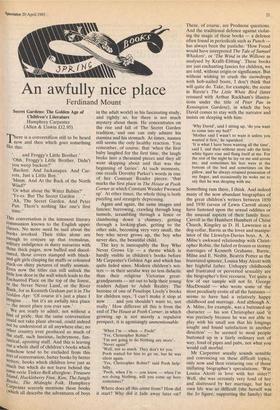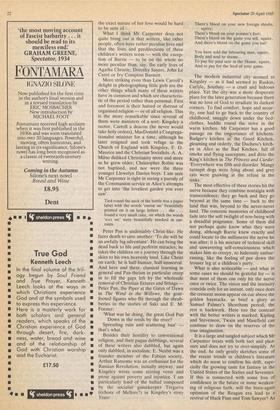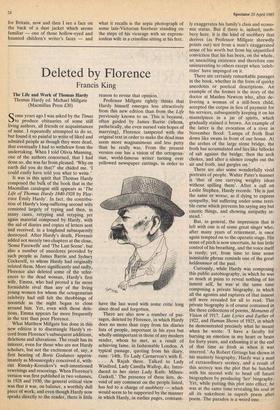An awfully nice place
Ferdinand Mount
Secret Gardens: The Golden Age of Children's Literature Humphrey Carpenter (Allen & Unwin £12.95) There is a conversation still to be heard now and then which goes something like this: . . and Froggy's Little Brother.' `Ohh, Froggy's Little Brother. Didn't you weep buckets?'
`Buckets. And Jackanapes. And Car- rots, Just a Little Boy.'
`Mmm. And At the Back of the North Wind?'
`Or what about the Water Babies?' 'Ye-es. But The Secret Garden . . `Ah, The Secret Garden. And Peter Pan. There's nothing like one's first time.'
This conversation is the intensest literary communion known to the English upper classes. No more need be said about the books invoked. Their titles alone are enough to conjure up that tremulous, solitary indulgence in dusty nurseries with those thick pages, now buffed and discol- oured, those covers stamped with black- and-gilt girls clasping fur muffs or coloured stuck-on shiny pictures of muffy animals. Even now the titles can still unlock the little low door in the wall which leads to the Enchanted Place on the top of the forest, or the Never Never Land, or the River sank, for as Kenneth Graham put it in The Golden Age: 'Of course it's just a place I Imagine . . . but it's an awfully nice place
the nicest place you ever saw.'
, We are ready to admit, not without a hint of pride, that the same conversation could not take place abroad, could indeed not be understood at all anywhere else; no Other country ever produced so much of the stuff, such luscious, lachrymose, fan- tastical, upsetting stuff. And this is leaving out a whole shelf of children's books which somehow tend to be excluded from this sort of conversation, better books by better Writers, books which children love just as Much but which do not leave behind the same eerie Tinker-Bell afterglow: Treasure Island, Huckleberry Finn, Kim, The Jungle Rooks, The Midnight Folk. Humphrey C arpenter scarcely mentions these books kwhich all describe the adventures of boys in the adult world) in his fascinating study, and rightly so, for there is not much mystery about them. He concentrates on the rise and fall of The Secret Garden tradition, • and one can only admire his stamina and his stomach. At times, nausea still seems the only healthy reaction. You remember, of course, that 'when the first baby laughed for the first time, the laugh broke into a thousand pieces and they all went skipping about and that was the beginning of fairies'. At such moments, one recalls Dorothy Parker's words in one of her Constant Reader pieces: 'that marks the first place in The House at Pooh Corner at which Constant Weader Fwowed up'. At other times, the whole thing is both puzzling and strangely depressing.
Again and again, the same images and fancies: burrowing, crawling through long tunnels, scrambling through a fence or clambering down a chimney, getting through a looking-glass, getting to the other side, becoming very very small, the boy who never grows up, the boy who never dies, the beautiful child.
The key is inescapably the Boy Who Never Grows Up — a theme which is hardly visible in children's books before Mr Carpenter's Golden Age and which has quite faded since. Modern children's wri- ters — in their secular way no less didactic than their religiose Victorian great- grandparents — set out to help their young readers Adjust to Adult Reality. The heroine of one of Penelope Lively's books
for children says, 'I can't make it stop at now . . . and you shouldn't want to, not really.' How different all this is from the end of The House at Pooh Corner, in which growing up is not merely a repulsive prospect, it is agonisingly unmentionable:
`When I'm — when — Pooh!'
'Yes, Christopher Robin?'
`I'm not going to do Nothing any more'. 'Never again?'
`Well, not so much. They don't let you.' Pooh waited for him to go on, but he was silent again.
'Yes, Christopher Robin?' said Pooh help- fully.
'Pooh, when I'm — you know — when I'm not doing Nothing, will you come up here sometimes?'
Where does all this come from? How did it start? Why did it fade away later on?
These, of course, are Prodnose questions. And the traditional defence against violat- ing the magic of these books — a defence often found in periodicals such as Punch has always been the pastiche: 'How Freud would have interpreted The Tale of Samuel Whiskers', or 'The Wind in the Willows as analysed by Krafft-Ebbing'. These books are just enchanting fancies for children we are told, without origin or significance. But without wishing to crush the snowdrops with hob-nailed boots, I don't think that will quite do. Take, for example, the scene in Barrie's The Little White Bird (later reissued with Arthur Rackham's illustra- tions under the title of Peter Pan in Kensington Gardens), in which the boy David comes to stay with the narrator and insists on sleeping with him:
`Why David', said I sitting up, 'do you want to come into my bed?'
'Mother said I wasn't to want it unless you wanted it first,' he squeaked.
It is what I have been wanting all the time', said I, and then without more ado the little white figure rose and flung itself at me. For the rest of the night he lay on me and across me, and sometimes his feet were at the bottom of the bed and sometimes on the pillow, and he always retained possession of my finger, and occasionally he woke me to say that he was sleeping with me.
Something rum there, I think. And indeed many of the now abundant biographies of
the great children's writers between 1850 and 1930 (seven of Lewis Carroll alone) have fastened upon the sexual oddities or the unusual aspects of their family lives: Carroll as the Humbert Humbert of Christ Church, Kingsley as D. H. Lawrence in a dog-collar, Barrie as the lover and manipu- lator of the Llewelyn-Davies boys, A. A. Milne's awkward relationship with Christ-
opher Robin, the failed or frozen or stormy marriages of Kenneth Grahame, Barrie, Milne and E. Nesbit, Beatrix Potter as the frustrated spinster, Louisa May Alcott 'with her frightful father. Unhappy childhoods and frustrated or perverted sexuality are the biographer's first recourse. Yet quite a few of our sample will not fit. George MacDonald — who wrote some of the most peculiarly erotic of all the fantasies seems to have had a relatively happy childhood and marriage. And although A. A. Milne, for example, was a buttoned-up character — his son Christopher said It was precisely because he was not able to play with his small son that his longings sought and found satisfaction in another direction' — he seemed to most people buttoned up in a fairly ordinary sort of way, fond of pipes and pubs, not what you would call morbid.
Mr Carpenter usually sounds sensible and convincing on these difficult topics, only now and then venturing one of those titillating biographer's speculations: Was Louisa Alcott in love with her sister?' Well, she was certainly very fond of her and distressed by her marriage, but her - own life was so difficult (she herself was the Jo figure, supporting the family) that the exact nature of her love would be hard to be sure of.
What I think Mr Carpenter does not quite bring out is that writers, like other people, often have rather peculiar lives and that the lives and predilections of these children's writers seem — with the excep- tion of Barrie — to be on the whole no more peculiar than, say, the early lives of Agatha Christie, Dorothy Sayers, John Le Carre or Ivy Compton Burnett.
More striking even than Lewis Carroll's delight in photographing little girls are the other things which many of these writers have in common and which are characteris- tic of the period rather than personal. First and foremost is their hatred or distrust of organised religion — or of all religion. This is the more remarkable since several of them were ministers of a sort: Kingsley a rector, Carroll a deacon (he never would take holy orders), MacDonald a Congrega- tionalist minister for a time, although he later resigned and took refuge in the Church of England with Kingsley, F. D. Maurice and the Christian Socialists. A. A. Milne disliked Christianity more and more as he grew older; Christopher Robin was not baptised, and nor were the three younger Llewelyn Davies boys. I am sure Mr Carpenter is right in seeing a parody of the Communion service in Alice's attempts to get into 'the loveliest garden you ever saw'.
Tied round the neck of the bottle was a paper label with the words 'DRINK ME' beautifully printed on it on large letters . . she . . found a very small cake, on which the words 'EAT ME' were beautifully marked in cur- rants.
Peter Pan is undeniably Christ-like. He faces death to save another: `To die will be an awfully big adventure'. He can bring the dead back to life and perform miracles; he takes the children on a journey through the
skies to his own heavenly land. Like Christ on earth, he is half-human, half-immortal. And here and there, classical learning in general and Pan-theism in particular creep in to fill the gaps left by the wholesale removal of Christian fixtures and fittings Peter Pan, the Piper at the Gates of Dawn in The Wind in the Willows, the goat- footed figures who flit through the shrub- beries in the stories of Saki and E. M. Forster:
`What was he doing, the great God Pan Down in the reeds by the river?
Spreading ruin and scattering ban' that's what.
Besides their hostility to conventional religion, and their pagan dabblings, several of these writers also dabbled, but again only dabbled, in socialism: E. Nesbit was a founder member of the Fabian society, Arthur Ransome was an enthusiast for the Russian Revolution, initially anyway, and Kingsley wrote some stirring verse and prose against poverty and injustice. I am particularly fond of the ballad composed by the socialist gamekeeper Tregarva (echoes of Mellors?) in Kingsley's story Yeast:
There's blood on your new foreign shrubs, squire; There's blood on your pointer's feet; There's blood on the game you sell, squire, And there's blood on the game you eat!
You have sold the labouring man, squire, Body and soul to shame, .
To pay for your seat in the House, squire, And to pay for the feed of your game.
The modern industrial city seemed to Kingsley — as it had seemed to Ruskin, Carlyle, Southey — a cruel and hideous place. Yet the city was a more desperate
place for the later generation because there was no love of God to irradiate its darkest corners. To find comfort, hope and secur- ity, one had to go back to the country of childhood, snuggle down under the bed- clothes, huddle round the stove in the warm kitchen. Mr Carpenter has a good passage on the importance of kitchens: Badger's kitchen as' the Good Kitchen, gleaming and orderly, the Duchess's kitch- en in Alice as the Bad Kitchen, full of smoke and flying saucepans, and ditto the King's kitchen in The Princess and Curdie: `Everywhere was filth and disorder. Mangy turnspit dogs were lying about and grey rats were gnawing at the refuse in the sinks.'
The most effective of these stories hit the nerve because they combine nostalgia with transcendence; they go back and they go beyond at the same time — back to the land that was, beyond to the never-never land. The concrete memories of childhood fade into the soft twilight of non-being with a dreadful poignance. Some of them did not perhaps quite know what they were doing, although Barrie knew exactly and could locate to the millimetre the nerve he was after; it is his mixture of technical skill and unwavering self-consciousness which makes him so creepy, so hideously embar- rassing, like the feeling of pee down the trouser leg at a children's party.
What is also noticeable — and what in some cases we should be grateful for — is that most of them can only hit the nerve once or twice. The vision and the intensity coincide only for an instant, only once does the crescent moon appear on cue above the golden haystacks, as brief a glory as. Samuel Palmer's Shoreham period; the rest is hackwork. Here too the contrast with the better writers is marked; Kipling and Stevenson, Twain and Masefield can continue to draw on the reserves of the true imagination.
It is a large and tangled subject which Mr Carpenter treats with both tact and plea- sure and does not try to over-simplify. At the end, he only gently sketches some of the recent trends in children's literature which do seem to confirm his drift, espe- cially the growing taste for fantasy in the United States of the Sixties and Seventies.
If this is connected with some loss of confidence in the future or some weaken-
ing of religious faith, will the born-again optimism of the Reagan era lead to a revival of Huck Finn and Tom Sawyer? As for Britain, now and then I see a face on the back of a dust jacket which seems familiar — one of those hollow-eyed and haunted children's writer's faces — and what it recalls is the sepia photograph of some late-Victorian forebear standing on the steps of his vicarage with an express- ionless wife in a crinoline sitting at his feet.
















































 Previous page
Previous page